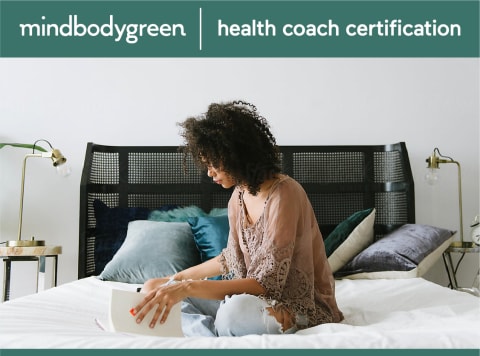Advertisement
How mbg's Health Coaching Program Has Made Me A Better Communicator


I've worked in marketing almost my entire professional career, yet I spend my spare time listening to health podcasts, reading books on the body and mind, cooking nourishing meals, and moving my body in ways that make me feel good (including my favorite—walking my dogs!). It wasn't until late last year that I realized maybe my passions were telling me something.
My journey to health coaching
I recently started to think that health coaching could be the perfect way to combine my passion for health with my desire to help others feel better. Once I got the idea in my head, the voice to pursue health coaching got so loud that I just couldn't ignore it. And I so happened to get an email from mindbodygreen about their health coaching program right around the same time (the universe was listening!).
Fast-forward almost a year, and I am currently more than halfway through the mindbodygreen Health Coaching Certification (HCC) program, and I couldn't be happier with my decision to pursue this path that aligns with my values.
When I enrolled in a health coaching program, I didn't expect it to teach me so much about relationship-building
What's been so eye-opening about this journey is not only am I learning how to become the best coach I can be; I'm learning how to become the best person I can be. Whether it's how to make people feel heard, deepening my mindfulness practices, or finding one's true motivators, it's been useful to learn many things that will benefit my professional career and personal life.
Going into this program, my fellow classmates and I showed up thinking health coaching would entail a pretty prescriptive relationship with clients. We figured a client would come in with a goal (wanting to eat healthier, for example) and we'd tell them how to get there.
But what I've learned is that giving someone the answer doesn't really teach them anything, and it also might not be the right solution for them.
In health coaching, the client is in the driver's seat, and the coach is in the passenger's seat. There are many paths to get where they want to go, and we help them get there—but we're not leading the way. This was a difficult mindset shift to make at first. But after practicing this type of coaching in my program and with my own clients, I've seen how truly magical these techniques are in action.
3 effective communication skills that I learned from HCC
mindbodygreen's Health Coaching Certification program has taught me valuable ways to build strong relationships with clients using psychology principles. I believe that these lessons are also strengthening my personal relationships, as well as making me a better communicator.
Because this information is too good not to share, here are three principles from health coaching that you can practice in your own relationships. I hope you'll find this as impactful as I have:
Nonviolent communication (NVC)
Don't let the name throw you off, as this is especially valuable for romantic partnerships (or any relationship, really!). Using four basic components, you can communicate more effectively and empathetically while ensuring sure each person's needs are met. NVC is comprised of:
- Observations: What we see or hear, without judgment
- Feelings: Our emotional experience and physical sensations
- Needs: The needs or values not being met in this moment
- Requests: Making a request to meet our needs
To put this into perspective, instead of saying, "You left the dishes in the sink—you're so messy!" you could use NVC to say, "When dishes are left in the sink, I feel overwhelmed and anxious because I value organization as it keeps my mind at ease. Would you be willing to share the responsibilities of cleaning the dishes?"
Active listening
This one is much easier said than done these days, with all of the distractions we face. However, when you use techniques like reflective statements (restating what someone said or how they're feeling) and asking open-ended questions (sparking curiosity in what they have to say, without judgment), the person talking to you will not just feel like you're listening but that they're being heard.
Mindfulness
There are several aspects to mindful coaching, but one that could be particularly helpful for relationship building involves tapping into what your body is telling you while speaking with someone.
I've learned through HCC that there are three "wisdom centers" in the body, with accompanying questions you can ask each:
- Mind/thoughts: What thoughts am I having right now? How are these thoughts impacting my body and physiology?
- Heart: Is my heart open or closed? Do I feel constricted in the front/back of the heart or relaxed, soft, and ready to receive?
- Body: Where is my energy open versus restricted?
Notice where you feel these sensations during your conversation and where they may show up in the other person. Practicing mindfulness in this way gives you an opportunity to understand yourself and others on a whole new level.
The takeaway
I went into mindbodygreen's HCC program expecting to learn the basics of how to help people read their health goals. I'm walking away with a much richer understanding of empathy and how to meaningfully connect with people. Nonviolent communication, active listening, and mindful exploration are three ways the program has taught me to better understand others—and myself.
